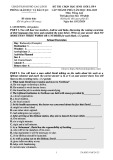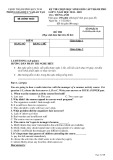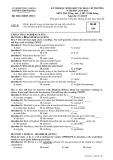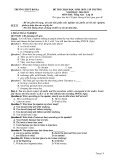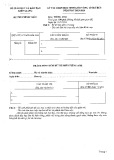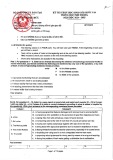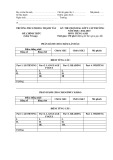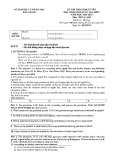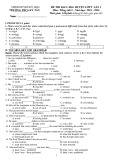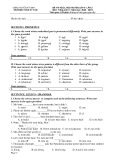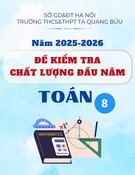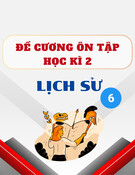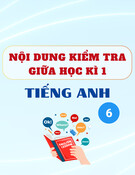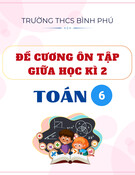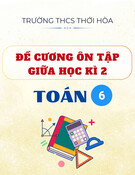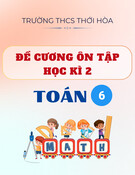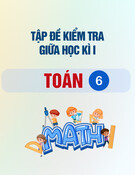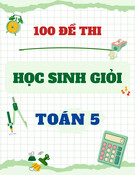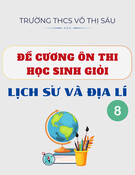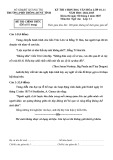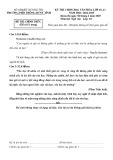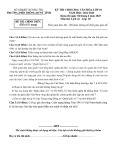
Page 1/7
SỞ GD&ĐT VĨNH PHÚC
TRƯỜNG THPT YÊN LẠC 2
——————
KÌ THI KSCL ĐỘI TUYỂN HỌC SINH GIỎI KHỐI 12
ĐỀ THI MÔN TIẾNG ANH
NĂM HỌC 2019 - 2020
Thời gian làm bài 180 phút, không kể thời gian giao đề.
Đề thi gồm: 07 trang.
———————
Giám thị coi thi không giải thích gì thêm.
Học sinh làm bài vào giấy thi.
A. LISTENING
Part 1: Listen and complete the passage below. Write NO MORE THAN THREE WORDS OR A
NUMBER for each answer.
Korean parents love to send their children abroad to study. They believe the
benefit to the child is worth all the (1)__________. Critics say it is not. They say the
Korean is good enough. It is a system that already provides English language to study.
There are also many English (2)__________in Korea. They are a good way for children
to learn English. Native speakers teach students English games and songs. These camps
are set up to be (3)___________.
Despite the fact that most students are staying in Korea, studying abroad is a
(4)___________. There were about 94,000 Korean students in America, according to the
2006 Asian Migration Atlas. Though it is popular, there are some risks for students
(5)__________. Parents are concerned about the (6)__________of their children.
Another worry is that families will be split up. Children and their mothers often move to
English speaking countries together. The father is then (7)__________. He is called
"goose dad." He must migrate like a goose to see his family. Also, Korean students often
meet other Koreans while overseas. They fall into the habit of only speaking Korean,
and let their chance to learn English slip through their fingers.
Critics also say overseas education costs too much money. This may be true for
many families. For example, a home stay in Canada in 2010 cost (8)_________Canadian
dollars. However, a home stay is a popular choice for Korean parents. Their children get
the added benefit of living with a local family. They take part in (9)__________. The
children also brush up on their language skills. This experience is valuable because they
also learn the culture.
Yes, there are problems with studying overseas. However, education in Korea is
very important. In spite of the costs and concerns, parents will always make
(10)_________ for their children's education.

Page 2/7
Part 2: Listen to a conversation between Marcus and Catherine about their homework.
Decide the statements are True (T) or False (F). Write your answers in the corresponding
numbered boxes .
Statements
True
False
1. Catherine finds it hard to understand why Marcus has so much homework.
2. Catherine thinks visiting the museum was a good experience for Marcus.
3. Catherine offers to show Marcus the math homework she has already done.
4. Marcus worries that the teacher might be angry if Catherine helps him.
5. After talking to Catherine, Marcus feels more confident about his
homework.
Part 3: You will hear a radio interview with a man called Robin Marshall, who has
written a book about Argentina. Listen and answer questions.
1. What was Robin’s job in Argentina?
A. translator B. tour guide C. travelling salesman
2. On Robin’s last trip to Argentina, the weather was ______.
A. colder than he expected
B. suitable for what he planned
C. different from the forecasts he heard
3. How did Robin feel during the dance performance he saw?
A. He wanted to get up and dance.
B. He wished he had continued his dance classes.
C. He was sad he didn’t dance well.
4. What did Robin do while he stayed in the village?
A. He went on a bus tour. B. He went into the forest. C. He went on a river trip.
5. What did Robin like about his favourite place?
A. the wildlife B. the views C. the peace

Page 3/7
B. PHONETICS
Pick out the word whose stress pattern is different from that of the other words. Identify
your answer by circling the corresponding letter A, B, C or D.
1. A. important B. accident C. candidate D. institute
2. A. diversity B. biography C. economy D. fundamental
3. A. generous B. suspicious C. constancy D. sympathy
4. A. understand B. appearance C. remember D. composer
5. A. communicate B. independent C. university D. entertainment
C. LEXICO-GRAMMAR
Part 1. Complete the following sentences by choosing the correct answer A, B, C or D.
1. I remember ___________ my mother said the grass in the garden needed _________.
A. to hear/cutting B. hear/cut C. heard/to cut D. hearing/ cutting
2. You gave me a lift yesterday; otherwise I__________ late for school.
A. would be B. wouldn't be C. would have been D. wouldn't have been
3. Under the table_____________ that has lived with him for 20 years.
A. his dog sits B. does his dog sit C. sit his dog D. sits his dog
4. She is a kind of woman who does not care much of work but generally _____________ only
with colleagues for meals, movies or late nights at a club.
A. supposes B. socializes C. attends D. discusses
5. I read the contract again and again __________ avoiding making spelling mistakes.
A. in view of B. in terms of C. with a view to D. by means of
6. ________ as a masterpiece, a work of art must transcend the ideals of the period in which it
was created.
A. Ranking B. To be ranked C. Being ranked D. In order to be ranking
7. These ___________ boots belong to Jim.
A. leather red riding B. red leather riding C. leather riding red D. red riding leather
8. A: “Excuse me, can you tell me the way to the post office?”
B: “Sorry, I’m new here.”
A: “________”
A. You’re welcome B. Bad luck C. That’s true D. Thank you all the same
9. Teacher: “Self-studying is an inseparable part of effective learning.”
Student: “____________”
A. I’ll say B. Good job! C. By all means D. I got a clue.
10. It ___________without saying that winners never quit and quitters never win.
A. comes B. means C. is D. goes
Part 2. Supply the correct form of the word provided to the right of each blank.
Education is more important today than ever before. It helps people acquire the skills
they need for such everyday (1. act)_______ as reading a newspaper or managing their money.
It also gives them the (2. special)_______ training they may need to prepare for a job or career.
For example, a person must meet certain (3. educate) _______ requirements and obtain a license
or certificate before he can practice law or medicine. Many fields, like computer operation or
police work, require (4. satisfy) _______ completion of special training courses.

Page 4/7
Education is also important because it helps people get more out of life. It increases their
(5. know) _______ and understanding of the world. It helps them acquire the skills that make
life more interesting and (6. enjoy)_______ such as the skills needed to participate in a sport,
paint a picture, or play a (7. music) _______ instrument. Such education becomes (8.
increase)_______ important as people gain more and more leisure time.
Education also helps people adjust to change. This habit has become necessary because
social changes today take place with increasing speed and (9. effect)_______ the lives of more
and more people. Education can help a person understand these changes and provide him with
the skills for (10. adjust) _______ to them.
Part 3: There are 10 errors in the following passage. Underline the mistakes and correct
them in the space provided.
Example: 0. was is
It UwasU the human factor that contributes to the absolute majority of road accidents which
involves the tremendous toll of fatalities each year. Other, less decisive, causes are vehicle
malfunctions or road shortcomings.
Speeding motorists are notorious for failing to give way at junctions, misjudging the
situation on the road or being unable to accurate estimate the distance while overtaking the
“snail pacers” ahead. Drinkers whom settle behind the wheel after one glass or two may be
running the risk of causing a tragedy through their impaired perception, which is not such rare a
case again.
Unfortunately, it is much simpler to introduce the necessary alterations in the traffic
system that change the behavioral patterns of drivers. There are voices that more severe
disciplinary resolutions ought to be put into practice if the vehicle users are to benefit with the
greater security on the road. The idea of producing safe road users through pre-school parental
instructions or through incorporating the safety regulations into school curriculum have been
widely acclaimed in many communities and is expected yielding the required results as the first
step in bettering the qualifications of the future drivers and acquainting them with the potential
hazards that may raise on the road.
1.
2.
D. READING COMPREHENSION
Part 1. Read the following passage and use ONE word to fill in each gap.
THE BLOOD MOON
A lunar eclipse occurs (1) ________the Earth’s shadow falls directly onto the moon.
(2) ________ happens as a result is that the moon stops being a silvery white colour and turns
coppery red instead; the sort of colour usually only seen in the sky at dawn or sunset. An
astronaut on the moon, looking towards Earth (3) ________ a lunar eclipse, would see a black
disc, surrounded (4) ________ a bright red ring. It’s the light from this red ring which is
reflected back to the dark Earth from the moon’s surface. In ancient times, long (5) ________
any of this was understood, the lunar eclipse was known (6) ________a blood moon and was
thought to be an omen of disaster.
Total eclipses can only occur when there is a full moon, and then only if it is lined up
with the Earth in a particular way. (7) ________easily obscured by cloud cover, blood moons

Page 5/7
are fairly common, and it is relatively easy to calculate where and when you might be (8)
________ to see one.
For example, in 1504 Christopher Columbus was stranded in Jamaica and in dire need of
provisions, but the local inhabitants were reluctant to help. However, Columbus knew that a
lunar eclipse would occur on 29 February. Therefore, the day before, he warned local leaders
that the moon would disappear (9) ________ they helped him. They remained skeptical. But
when the moon slowly started to change colour, they became (10)__________frightened that
they started to bring food.
Part 2. Read the passage and choose a suitable word to fill in each blank.
“Just imagine a day without paper,” reads one advertisement for a Finnish paper
company. It adds, “You almost (1)________ see our products every day.” And they’re right.
But in most industrial countries, people are so (2)________ to paper – whether it’s for holding
their groceries, for drying their hands or for (3)________ them with the daily news- that its
(4)________ in their daily lives passes largely unnoticed.
At one (5)________ paper was in short supply and was used mainly for important
documents, but more recently, growing economies and new technologies have (6)________ a
dramatic increase in the (7)________ of paper used. Today, there are more than 450 different
grades of paper, all designed for a different (8)________.
Decades ago, some people predicted a “paperless office”. (9)________, the widespread
use of new technologies has gone hand-in-hand with an increased use of paper. Research into
the relationship between paper use and the use of computers has shown that the general
(10)________ is likely to be one of growth and interdependence. However, the costs involved in
paper production, in terms of the world's land, water and air resources, are high. This raises some important
questions. How much paper do we really need and how much is wasted?
1. A. positively B. obviously C. certainly D. absolutely
2. A. conscious B. acquainted C. familiar D. accustomed
3. A. providing B. delivering C. contributing D. giving
4. A. task B. operation C. service D. role
5. A. time B. instance C. date D. occasion
6. A. called on B. come around C. brought about D. drawn up
7. A. total B. portion C. number D. amount
8. A. point B. goal C. purpose D. result
9. A. Instead B. Besides C. Otherwise D. Alternatively
10. A. method B. order C. trend D. system
Part 3: Read the following passage and choose the best answers.
We live in a world of tired, sleep deprived people. In his book Counting Sheep, Paul Martin
– a behavioral biologist – describes a society which is just too busy to sleep and which does not
give sleeping the importance it deserves.
Modern society has invented reasons not to sleep. We are now a 24/7 society where shops
and services must be available all hours. We spend longer hours at work than we used to, and
more time getting to work. Mobile phones and email allow us to stay in touch round the clock
and late-night TV and the Internet tempt us away from our beds. When we need more time for
work or pleasure, the easy solution is to sleep less. The average adult sleeps only 6.2 hours a

